
Midori Komatsu
Nascimento : 1891-09-09, Tokyo, Japan
Morte : 1982-10-26
História
Komatsu Midori was born in Tokyo in 1891. From the age of five she studied at the Bando dance school and in 1911 joined a female theater which had just been formed, the Nakasu Masagoza. In 1912 at the age of 21 she made her stage debut. In 1913 upon the invitation of Shochiku Gomei, she participated in the female theater group the Kyoto City Second Kyogoku Taishoza where she continued her activities until 1915, when she chose to take the path leading towards action pictures. In 1919 she negotiated with Kunikatsu films and the following year joined the company. She was aiming to be a real movie star. At Kunikatsu she appeared in Shoshurei, Minashi Go and Chishio no Naruto. After the Great Kanto Earthquake of 1923 she joined Shochiku Shimogamo. She concentrated mainly on period dramas such as Nichiren Komachi, Yoshii Masayuki and Kane no Naruhi (The Day the Bell Tolls). In 1925 she transferred to Nikkatsu Daishogun Studios and appeared in Nakayama Yasubei, and Rakka no Mai. From this time onward she came to be in demand for elderly roles and the roles of mothers. From the 1930s she built up a portfolio of supporting roles, and then taking a professional name in the Wakayagi school of dancing, she took on the responsibility of choreography for the Nikkatsu Period Drama Theater. In 1942 she transferred to Daiei. She then concentrated mainly on period dramas until her retirement in 1964. She died in 1982 at the age of 91.

The beginning of the Showa period. A town in the Kanto region. During the autumn festival, a car from Daihoji Senzo hit a child and left. Upon hearing this, Shogoro Chiba's boss tried to pay for the medical treatment of Kenbo, but Senzo ordered his child Gentaro to claim damages to the car and ruined Shogoro's gambling house.

After being bailed out of trouble by a member of the Kaijima Clan, Ryuhei dedicates himself to saving the Kajima’s lucrative lumber business.

A Japanese film

Pinku from 1965.

Proprietress of the Inn
Pinku from 1965.

старуха
Yoso is truly a lost classic, set in the Nara Era (710-794), from Kinugasa Teinosuke the same writer/director who gave us the recognized classic Gate of Hell (Jigokumon, 1952) & the milestone silent surrealist masterpiece A Page of Madness (Kurutta Ippeji, 1926).
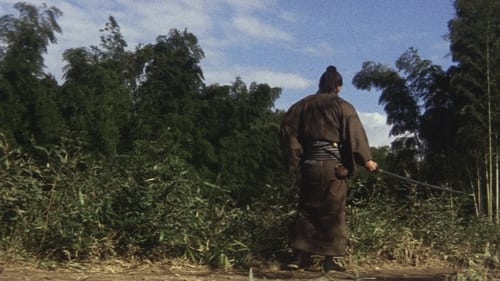
As winds of change sweep Japan, an honest man joins the Shinsenhumi out of admiration for its leader and because he wants to live and die as a samurai. However, as his involvement grows, reality and idealism come into deadly conflict.
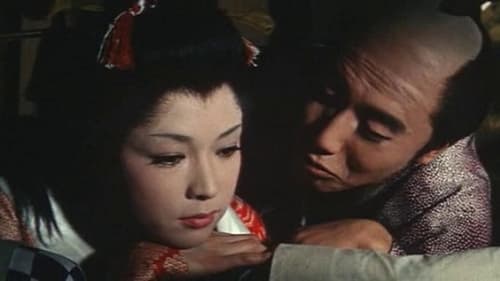
Fascinated with women from an early age, Yonosuke had his first sexual encounter at the age of seven. From that day on, he recklessly and forwardly pursues women, feeding his fascination and experience. As Yonosuke's salacious behavior brings much cause for shame to the family, his father eventually breaks relations with him. Expelled from the family, 19-year-old Yonosuke embarks on a pilgrimage of lust, traveling far and wide to acquaint himself with women of all walks.
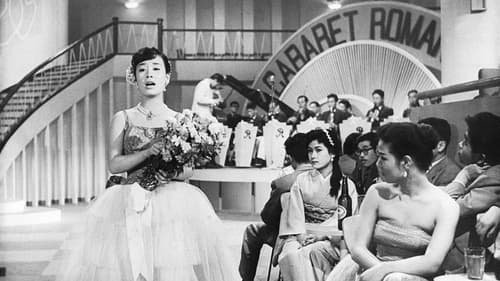
The cabaret «Romance», run by Masami Daisaku's father, is experiencing financial difficulties, and Masami is betting on changes and asks singer Hibari Misora to perform. Musical youth comedy with young actors, passion, funny songs and laughter. Hibari Misora appears as herself.

Aya
A traditional bar mistress in Kyoto clashes with her Tokyo rival.
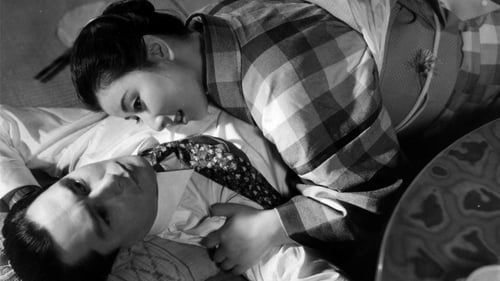
Auntie of Toshodaiji Temple
In Kyoto a young kimono maker with traditional ideas gets involved with a married professor.
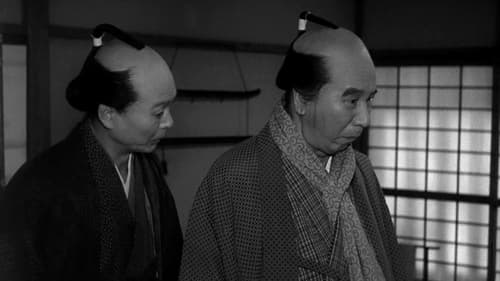
Old lady in tea house
No século XVII, esposa de um rico avarento vive insatisfeita e frustrada, e quando precisa de dinheiro para ajudar o irmão, recorre a um dos empregados do marido. Os dois são descobertos, mas o rapaz assume a culpa para salvá-la. Sabendo das traições do marido, ela decide arriscar tudo e fugir com o empregado.
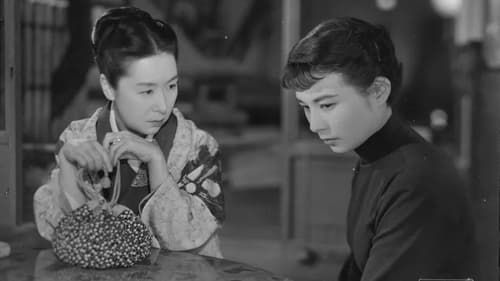
Okanu
Hatsuko Umabuchi é uma viúva proprietária de uma próspera e requintada casa de gueixas de Quioto. A filha, Yukiko, regressa de Tóquio, onde estudara música, depois de uma tentativa falhada de suicídio porque o noivo a deixou quando descobriu qual era a profissão da mãe. Hatsuko tem nesse momento uma ligação amorosa com um jovem médico, Matoba, responsável pela saúde das gueixas. O médico sente-se atraído por Yukiko, que inicialmente o rejeita por o associar ao negócio da mãe. No entanto, os seus sentimentos alteram-se gradualmente na ignorância de que ele é amante da mãe.
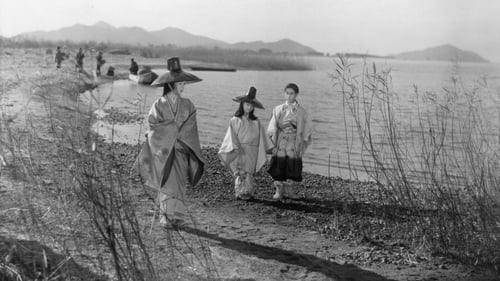
Harbour's lady
Japão, século XI. A família de Taira é separada pelas lideranças feudais. Seus dois filhos, Zushiô e Anju, são enviados para um campo de trabalho escravo comandado pelo temido Sanshô, enquanto sua esposa, Tamaki, é forçada a prostituir-se em uma região isolada. (e 12 - Estimado 12 Anos)

The Lord of Okazaki is killed by his brother-in-law. Although the Lord's widow bears a child, she is also killed. Then, a ghost cat begins stalking in the castle.
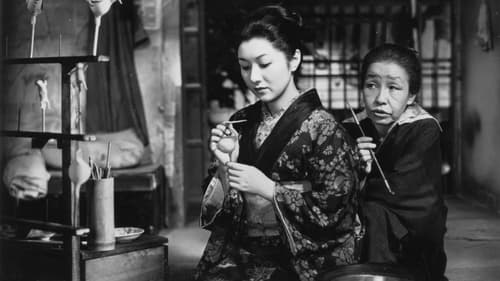
Oume
In the post-war Gion district of Kyoto, the geisha Miyoharu agrees to apprentice the 16 year-old Eiko, whose mother was a former geisha who had just died. After a year of training they have to find a large sum of money before Eiko can debut. Miyoharu borrows the money from the tea-house owner, Okimi, who in turn obtains the money from the businessman Kusuda. Kusuda fancies Eiko himself and wants to give Miyoharu to Kanzaki in order to close a large business deal. However both geishas have minds of their own and, going against tradition, want to be able to say no to clients.

Horror film directed by Minoru Inuzuka.

Hostess
Shinnosuke is introduced to Shizu as a prospective marriage partner, but he falls in love with her widowed sister Oyu. Convention forbids Oyu to marry because she has to raise her son as the head of her husband's family. Oyu convinces Shinnosuke and Shizu to marry so that she can remain close to Shinnosuke.

The film recounts the tragedy of a young outlaw.

Lost film, directed by Tomu Uchida. This film is a very funny comedy that makes fun of the moral code of the samurai Bushido, which has become obsolete and turned into an empty form during the period of feudalism.

Okatsu
Yaji and Kita: Yasuda's Rescue is a 1927 black and white Japanese silent film directed by Tomiyasu Ikeda.[1] This comedy film showcases the comic talent of Denjiro Okochi, which contrasts markedly with his heroic performance in Oatsurae Jirokichi Koshi. The humorous exchanges with Goro Kawabe, his senior at Nikkatsu, can be priceless, with the expressions and movements of the two goofy characters making for pure, hilarious slapstick comedy. A 15-minute remnant of the film was released on DVD by Digital Meme with benshi accompaniment by Midori Sawato and Ryubi Kato.

Directed by Kichiro Tsuji.

A captivating operetta by Masahiro Makino based on Juppensha Ikku's humorous novel "Tōkaidōchū Hizakurige" starring Chiezo Kataoka and Kyoji Sugi.













